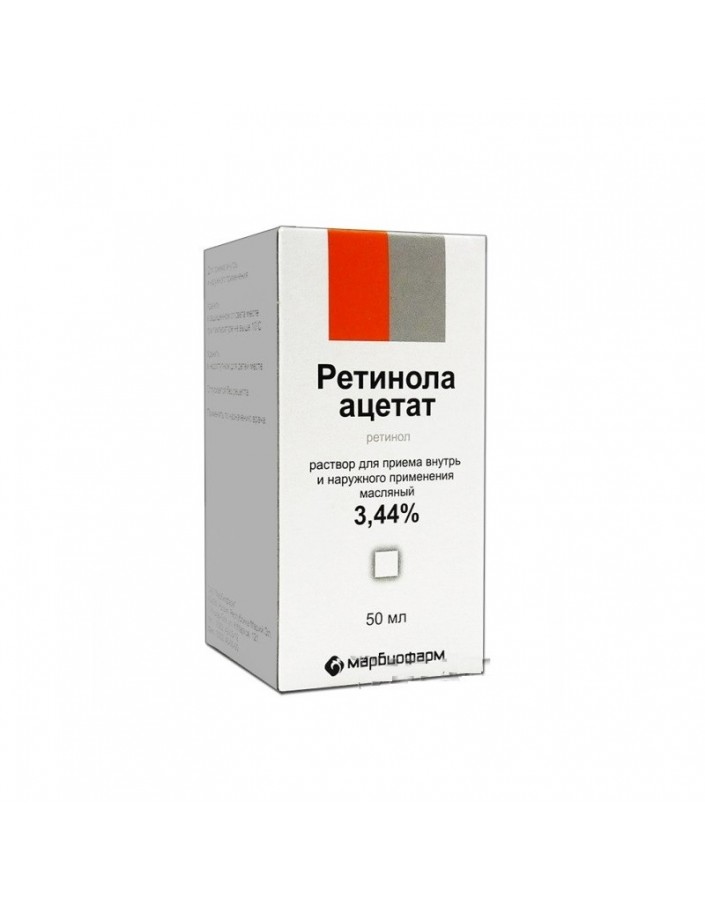




Security policy (edit with Customer reassurance module)

Delivery policy (edit with Customer reassurance module)

Return policy (edit with Customer reassurance module)
:
Vitamin A has a fortifying effect, normalizes tissue metabolism; participates in redox processes (due to a large number of unsaturated bonds), in the synthesis of mucopolysaccharides, proteins, lipids, in mineral metabolism, the processes of cholesterol formation. It enhances the production of lipase and trypsin, enhances myelopoiesis, cell division processes. Increases the body's resistance to infection. Enhances the division of epithelial cells of the skin, inhibits keratinization processes, enhances the synthesis of glycosaminoglycans. Participates in photoreception processes (improves visual adaptation to darkness).
:
Hypovitaminosis, avitaminosis A.
In the complex therapy of conditions accompanied by an increased need for vitamin A:
-infectious-inflammatory (including chronic) and "cold" diseases;
- lesions and skin diseases (frostbite of I degree, 1 degree burns, ichthyosis, hyperkeratosis, seborrheic dermatitis, psoriasis, neurodermatitis, some forms of eczema).
- eye diseases (retinitis pigmentosa, hemeralopia, xerophthalmia, keratomalacia, eczematous eyelid lesions).
- gastrointestinal diseases associated with impaired absorption of Retinol (gastroectomy, diarrhea, steatorrhea, celiac disease, Crohn's disease, malabsorption syndrome).
Dosing regimen:
The use of the drug should be carried out under medical supervision. The drug is taken orally (10 - 15 minutes after eating) in the early morning or late evening.
The highest single therapeutic dose for adults is 50,000 IU, daily 100,000 IU; for children, respectively - 5,000 IU and 20,000 IU.
For therapeutic purposes, mild to moderate avitaminosis is prescribed to adults up to 33,000 IU per day (retinol acetate solution in oil 3.44% - 6 drops), children over 7 years old - 5,000 IU per day (1 drop of retinol acetate solution in oil 3.44%).
In case of eye diseases, adults are prescribed - 50,000-100,000 IU per day (retinol acetate solution in oil, 3.44% -10-20 drops) and 0.02 g of riboflavin at the same time.
For skin diseases, adults are prescribed per day for 50,000-100,000 IU of retinol acetate and 5,000-10000-20000 IU for children.
Outwardly prescribed for frostbite, burns. After cleaning, the affected area is smeared with a solution and covered with a gauze bandage (up to 5 - 6 times a day, as scarring and epithelialization is reduced, the frequency of lubrication is 1 time per day), while retinol is administered orally or intramuscularly.
:
Allergic reactions.
Long-term daily intake of vitamin A can cause intoxication, hypervitaminosis A. Symptoms of hypervitaminosis A in adults - headache, drowsiness, lethargy, facial hyperemia, nausea, vomiting, pain in the bones of the lower extremities, gait disturbance. Children may experience: fever, drowsiness, sweating, vomiting, skin rashes.
:
Hypersensitivity to the components of the drug, hypervitaminosis A, pregnancy, gallstone disease, chronic pancreatitis, acute inflammatory skin diseases, children under seven years of age.
With care: nephritis, heart failure II-IIIst., Alcoholism, cirrhosis of the liver, viral hepatitis, renal failure, old age.
Use during pregnancy and lactation:
The drug is contraindicated for use in the first trimester of pregnancy.
In the period of lactation (breastfeeding) is not recommended to be applied on the skin of the mammary glands.
.
* Symptoms of acute overdose (develop 6 hours after ingestion):
hypervitaminosis A: in adults - drowsiness, lethargy, double vision, dizziness, severe headache, nausea, indomitable vomiting, diarrhea, irritability, bleeding gums, dryness and ulceration of the oral mucosa, peeling of the lips, skin (especially palms), confusion consciousness, increased intracranial pressure (in infants - hydrocephalus, protrusion fontanel).
* Symptoms of chronic intoxication: loss of appetite, bone pain, cracks and dry skin, dry oral mucosa, lips, gastralgia, vomiting, hyperthermia, asthenia, excessive fatigue, headache, photosensitivity, pollakiuria, nocturia, polyuria, irritability, prolapse hair, yellow-orange spots on the soles, palms,in the area of the nasolabial triangle, hepatotoxic effects, intraocular hypertension, oligomenorrhea, portal hypertension, hemolytic anemia, changes on radiographs of bones, convulsions.
* Treatment: drug withdrawal; symptomatic therapy.
Drug Interactions:
It should not be used in combination with other drugs containing vitamin A and retinoids, in order to avoid hypervitaminosis A.
Not compatible with Tetracycline antibiotics.
Storage conditions:
In the dark place at a temperature of no higher than 10 ° C.